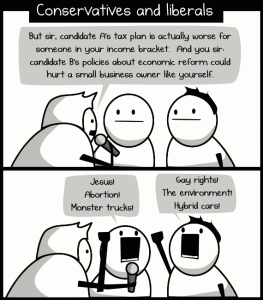The concept of neutrality (or moderation) seems to embody a sort of lofty wisdom in our culture, an ability to stay “above” the fighting. However, in reality, maintaining a strict neutrality is more often a sign of severe apathy, unwillingness to engage or fear of confrontation.
I’m not the kind of person who thinks in binary, so I won’t say that every dispute requires that one pick a side, but I will say that in the case of heated debate on an issue or set of issues, the underlying opposing viewpoints are often complex and merit some consideration. Moreover, the two (or more) sides are frequently uneven (i.e., one side often has a much stronger case), so if the neutralists could weigh the issues and involve themselves, they might help solve the issue in the most favorable way.
About 10 years ago, I was living with 2 roommates who were “random” in the sense that we’d met online and interviewed in person. While they weren’t friends, we were all civil and got along fine, I thought. Then after about 1 year, there was a conflict. I’d brought up some concerns regarding our landlord and was trying to bolster support for asking the landlord to take care of some things. After a few rounds of discussion (in person and on email), one of my roommates began cursing me out on the emails and became a complete jerk in person, slamming doors and refusing to talk to me. I did not respond in kind, rather I tried to re-open dialog calmly, to no avail. Baffled and upset, I asked the other roommate (who had witnessed this behavior) for help and she said that she didn’t want to get involved, that we were both being “extreme.”
At the time, I was angry at her for refusing to engage. Even if she’d told me I’d done something wrong and explained why, that would’ve been better than her “neutrality.” However, it was a great lesson for me: no matter how calm or reasonable one party may be, if the other party is cursing and off the rails, the disagreement appears outrageous and outsiders may assume both parties are “equal” participants, even though a less cursory consideration would show that, merits of each viewpoint aside, only one side is being unreasonable in their behavior.
Check out:
- “Radical Neutrality: …taking the middle ground becomes the most progressive choice…” image from the Savage blog on The Stranger.
-Agreed with Dan Savage’s comment. Neutrality is obviously not radical nor progressive, nor is it “new” minimalism – it’s just an unhelpful abstention. - This snippet (cut & cropped) from The Oatmeal comic on “How to Suck at Religion” which is supposed to be a satire about unreasonable and extreme viewpoints:

-I found this deeply offensive as it appears to equate concern for the environment and civil rights with “religion” (note: author is an outspoken atheist). The author appears to imply that reasoned people consider economic implications, but should be “neutral” on social issues when voting…
I can empathize with why some people shy away from impassioned debate. Perhaps they prefer more calm and reasoned discourse, but hiding behind neutrality is reductive, not productive. Moreover, for reasonable and compassionate people, it’s important to be an ally for those who are being disenfranchised.
First they came for the Socialists, and I did not speak out—
Because I was not a Socialist.Then they came for the Trade Unionists, and I did not speak out—
Because I was not a Trade Unionist.Then they came for the Jews, and I did not speak out—
Because I was not a Jew.Then they came for me—and there was no one left to speak for me.
-snippet of famous poem by pastor Martin Niemöller, about neutralists who aren’t concerned with things that don’t directly affect them, not realizing the indirect effects of their inaction (let alone the direct effects on other parties).
Often, neutrality can operate as tacit acceptance of the worst human behaviors or condemning “both sides” equally without taking the time to consider the issues at hand. Of course, neutrality on matters of narrow-focuses opinions (e.g., musical taste) is harmless, but some neutralists incorrectly “round up” all matters that don’t directly affect them (e.g., gay rights or women’s rights as “irrelevant” for straight males) as “opinion” when in fact the consequences are far-reaching (e.g., lack of contraception = more unwanted pregnancies which results in many personal and societal problems).
Staying out of it
never taking part
refusing all engagement
isn’t that extreme?
Of course, there are cases where one may legitimately not agree with either side, but it’s still possible to participate and speak up to support what points seem most favorable. For example, Democrats and Republicans each possess [general] stances on a variety of issues, and it’s possible to support some stances from each “side” without wholly agreeing with either. In any case, participation (where the effect is societal or far-reaching) is key. Neutrality is best saved for bar-room debates over sports or relative attractiveness.
